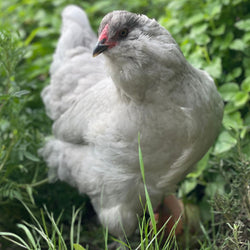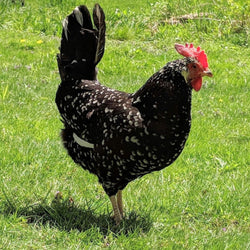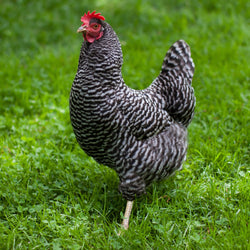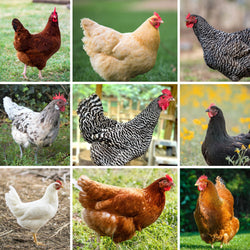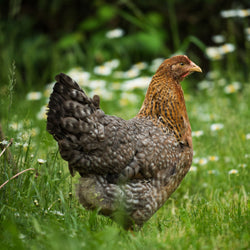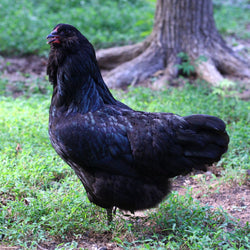page=9/--
Frequently Asked Questions
Here we answer the most commonly-asked questions about ordering, chicken care, and more.
What should I consider when choosing a waterer for my flock?
As you probably know by now, it's not a good idea -- at all -- to simply give chickens a bowl of water like you would a dog or a cat. They'll dirty it; they'll step in it and tip it over; they may even unintentionally poo in it. Here are 7 important questions to ask yourself when choosing a waterer for your flock: How many thirsty birds do you have? You need to make sure there is adequate access to water for all the birds in your flock. If you have a large flock but only one small waterer,...
Read MoreWhat is quarantine and when should I quarantine my flock?
In your backyard flock, quarantine is the act of isolating a chicken or chickens who has been potentially or actually exposed to contagious illness from the rest of your flock. When you introduce new chickens into your established flock, for example, you must quarantine the new chickens for four weeks from the rest of your flock. You don't want them to share feeders, waterers, or even the same air. You also want to be careful not to carry anything between the flocks on your person (on your shoes, for example) during this time. Hens in the Hen Pen Chicken run...
Read MoreWill my lawn be safe for my pet chickens after I've had it sprayed?
No, even if the lawn treatment may be safe for dogs and cats, it won't necessarily be safe for your pet chickens. Remember, dogs and cats are not foraging the lawn like your chickens are. Even if they nibble on a piece of grass, your lawn is just not going to be a large part of your dogs' or cats' diet! If you're doing a pelleted treatment, your chickens may be foraging those pellets out of there! And if it's a sprayed treatment, they could be eating whatever has been sprayed on. Sometimes lawn treatments include things like weed-specific herbicides,...
Read MoreHow much space should my chickens have in their run?
The "run" is a fenced or enclosed yard space you give your flock outdoors, where they can forage, sunbathe and generally engage in all the chicken-y behaviors that make them happy. The more space your flock has, the better! With lots of space, your flock will be less stressed. A large outdoor run area can also help balance a small coop. When your flock is concentrated into a very small area, they have more of a tendency to pick on one another and squabble. A larger RUN helps this situation far more than a larger COOP, because it's the run...
Read MoreHow much protein should be in my chicken feed?
The right protein content in your feed is super important for raising a healthy flock--and commercial rations are probably the easiest way to get the right amount, as well as the right nutrition for your birds. But if that's true, why do different brands have different levels of protein, and what amount in best? There's variation because there's an ideal range of protein content, AND because the range varies based on your birds' ages. Ideal protein for laying breeds based on age Chicks up to 6 weeks old: 20% - 22% protein 7 weeks to point of lay: 14% -...
Read MoreHow do I train my chickens to drink from nipples?
Many chicken keepers prefer nipple drinkers over conventional style drinkers for reasons of convenience and cleanliness. Nipple waterers involve so much less cleaning and are so much easier to refill, that they're quickly becoming the watering method of choice for backyarders. Nipple watering systems mean no more (daily? weekly?) cleaning a gunky mess of dirt, poo, and soiled wood shavings out of your watering trays! Whether you're starting baby chicks on nipples from day one, or whether you want to get your grown flock on nipples, there are a few important training considerations. Step one: Make sure you've got enough...
Read MoreHow do I find a veterinarian for my chicken or duck?
It's always a good idea to seek out an avian or farm veterinarian BEFORE you get chickens, so you'll know where to turn in case of any emergency or health crisis. Rather than calling every vet clinic around, we recommend you go straight to the source: the Association of Avian Veterinarians website. Here you can enter your location and you will be shown a list of avian vets in your area. If there are no avian or farm veterinarians near you, or they're not taking new clients, we're happy to recommend our friends at VetTriage. They're trained, licensed veterinarians who...
Read MoreHow many eggs do chickens lay per year?
Exactly 157. (Just kidding!) Actually, how many eggs a chicken lays a year depends on a lot of things, but especially on the breed of your chicken and her age. For instance, young Leghorns may lay 300 eggs per year. Young Cochins may lay only 100 or so. Sumatras may lay 50 or fewer. By breed, you can see a general idea of how many eggs chickens may lay per week here on My Pet Chicken's chicken breed list. But keep in mind that as the birds get older, they will lay fewer eggs. And some breeds are not great...
Read More







"The Clubhouse" Coop
Easy to assemble and built to last, the Clubhouse Coop is the perfect starter coop for a small flock.

